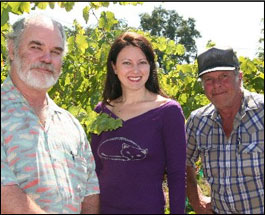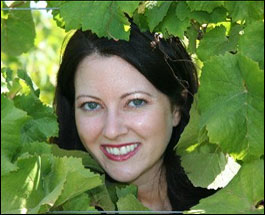
In 1852 a farmer named Richard
Hope Crane, straight from the California gold fields, arrived
on horseback to gaze over the Cotati Valley. He fell in love
with the fertile soil and moderate climate and knew he wanted
to stay and start a farm. He purchased property from Thomas
Page who was the grantee of the vast Rancho Cotate land grant.
With this land, land that now includes the Crane Melon Barn,
Crane Canyon Ranch and farmland for the Crane Melons, Richard
grew a variety of crops and raised livestock.
Over 150 years later the great, great grandson of Richard
Hope Crane, Richard Hayden Crane, owns Crane Canyon Ranch
and grows Crane Melons. His daughter, 6th generation farmer
Jennifer Crane, established Chester’s Vineyard in 2002.
Chester’s Vineyard borders the Bennett Valley appellation
to the east and the Sonoma Coast appellation to the west,
but does not fall into any official appellation. This orientation
helps provide the warm days and cool evenings that pinot
noir requires to produce high quality fruit |
This orientation helps provide the
warm days and cool evenings that Pinot Noir requires to produce
high quality fruit.
Crane vineyard includes Dijon and Italian
clone, all planted on 101-14 rootstock with a VSP trellis
system. The 100% black clay soil helps retain moisture, ensuring
that the vines are watered only occasionally. All of the
farming practices in place at the Crane Vineyard help give
the fruit distinct concentrated flavors and a complexity that
you can only obtain with world class Pinot Noir.
In 2005 a 2-acre
Pinot Noir block was planted at the Crane Melon Barn. The "Barn
Block" is
Pinot Noir Dijon clones on 101-14. The trellis is VSP and
includes
drip irrigation. Soils are sandy loan on the surface with
clay underneath.
The current release is 2009 David Noyes
Vineyard designated Crane Vineyard Pinot Noir.

|

